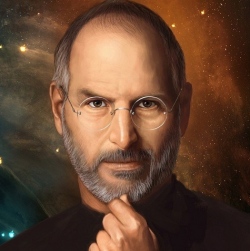
Whom should we revere from 50 years ago?
Should it be Pope John XXIII for excommunicating Fidel Castro? Or the Beach Boys for riding into the world with their surfin’ sound? Should it be John Glenn for being the first American to orbit the Earth? Or what then was known as the European Common Market (now the EU) for admitting Greece?
I ask because Malcolm Gladwell, author of "The Tipping Point," has expressed decidedly straight views on which of tech’s great and current names will be revered in 2062.
I am grateful to the often historical Business Insider for alerting me to Gladwell’s recent appearance at the Toronto Public Library’s Appel Salon.
Gladwell forcefully declared that Apple’s Steve Jobs would be something of a forgotten figure, especially in relation to Microsoft’s Bill Gates. (I have embedded the video. The important part starts at around the 9:30 mark.)
He said: "I firmly believe that 50 years from now, (Gates) will be remembered for his charitable work, no one will even remember what Microsoft is."
It’s an interesting point. Who remembers Electronic Data Systems, which Ross Perot created in 1962?
Still, Gladwell is the author of "Outliers," and he does enjoy offering outlying thought to stimulate debate. So who could be surprised that he didn’t stop at this flattery for Gates?
For he added: "And of the great entrepreneurs of this era people will have forgotten Steve Jobs. Who’s Steve Jobs again? There will be statues of Gates across the third world."
Who knows if there’ll even be an Earth in 2062? Yet Gladwell offers a perception that humanity will somehow manage to respect human goodness with statues and honors and forget rapacious, single-minded — in his words "amoral" — corporate leaders.
It’s an oddly optimistic thought. It’s always my impression that statues are often erected to honor conquerors and winners. In England, Admiral Lord Nelson and Queen Boadicea. In the U.S., George Washington and Willie Mays.
Still, Gladwell is fascinated that today we seem to revere certain corporate figures. He describes them as "our new prophets." Yet, for him, these great business people are, in essence slightly inhuman. They shutter any humanity they might have in favor of the pursuit of profit.
Something, though, happened to Gates.
"Gates is the most ruthless capitalist, and then he wakes up one morning and he says, ‘enough.’ And he steps down, he takes his money, he takes it off the table," said Gladwell.
"There’s a reasonable shot that, because of his money, we will cure malaria," he added.
